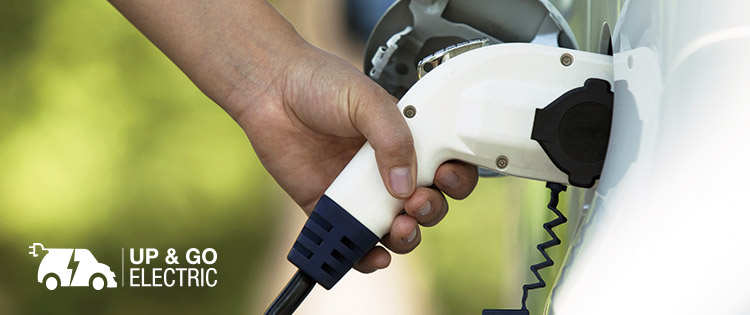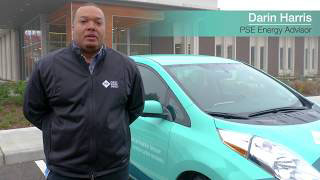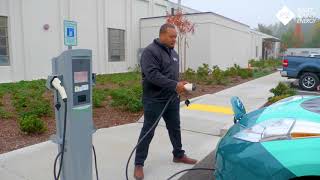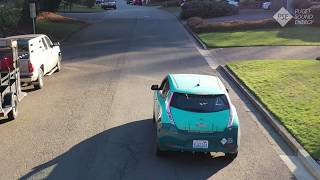
Charging an EV
With the average range of a new electric vehicle exceeding 250 miles per charge, it’s likely an EV will easily meet your daily driving needs. Even better: an EV can be charged while you work, sleep or simply live your life – that’s convenience that can’t be beat!
Charging is easy – with a little planning
The biggest change when you switch to an electric vehicle? No more gas stations! Driving electric is more convenient when you have:
- An outlet or charger near parking at your home (tell your property manager)
- Available workplace charging (tell your employer)
- Accounts and apps for public charging when you’re on the go
- A rough idea of the time needed to charge
If you live in a single-family home, all you need to charge is a standard 120V outlet and the Level 1 charging cord that comes with your vehicle. If you need a faster charge, you can also install a Level 2 charger, which requires a 240V outlet and an electrician.
Charging your EV will require a little more planning if you live in an apartment, condo or townhome without a dedicated parking space and outlet. But, there are solutions! PSE Up & Go Electric offers incentives for multifamily properties and workplaces to install charging at little to no cost for the exclusive use of their residents and employees.
When you charge matters
We care about the health of the electrical grid and environment, and we know our customers do too. Learn more about how charging your electric vehicle at certain times of day can make a difference – and even be more convenient for you.
Qualifying PSE customers can save on faster, more convenient charging via PSE rebate on a new Level 2 charger for their home. Plus, join Flex EV to continue saving on charging throughout the year.

Have questions about electric vehicles? We're here to help. Call us at 1-800-562-1482, Monday through Friday 8 a.m. to 5 p.m. or contact us below.
Qualifying PSE customers can save on faster, more convenient charging via PSE rebate on a new Level 2 charger for their home. Plus, join Flex EV to continue saving on charging throughout the year.
The difference between chargers
These are the types of chargers you’ll use while charging your electric vehicle at home, work or a public charging station. Note that exact charging rates depend on both your EV and the specific charger model.

Level 1 Charging
VOLTS: 120
CHARGING RATE: 2-5 miles of range per hour
WHERE: Anywhere with an outlet
This is the charging cord that comes standard with almost every EV. It has a conventional three-prong plug that goes into any properly grounded outlet.

Level 2 Charging
VOLTS: 240
CHARGING RATE: 10-25 miles of range per hour
WHERE: Home, work, public
Level 2 chargers can be found everywhere from office buildings to apartments to public charging stations, but they can also be installed at single-family homes with the help of a professional electrician.

DC Fast Charging
VOLTS: 300-800
CHARGING RATE: Full charge in under an hour
WHERE: Public
You’ll find DC fast charging, which look similar to gas pumps, at public charging stations, often located along highways or near shopping centers.
Learn more about charging





Have questions about electric vehicles? We're here to help. Call us at 1-800-562-1482, Monday through Friday 8 a.m. to 5 p.m. or contact us below.








